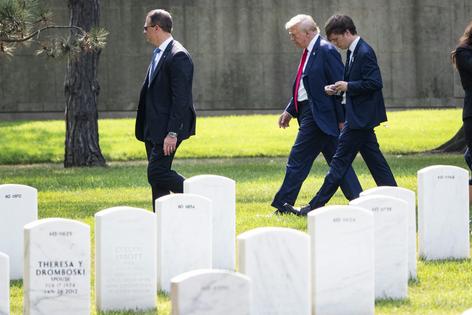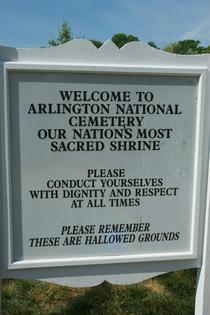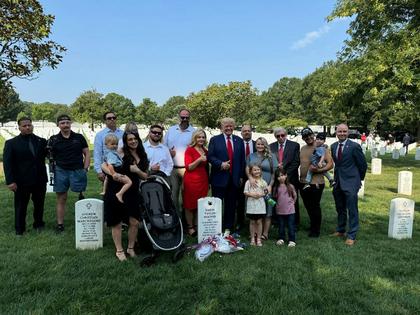Trump campaign violated rules in Arlington National Cemetery visit, cemetery legal expert explains
Published in Political News
The public furor continues over Donald Trump’s behavior during a visit to Arlington National Cemetery on Aug. 26, 2024.
Since that visit to the U.S. military burial ground outside Washington, D.C., news reports and campaign photos have emerged showing the former president grinning widely and giving a “thumbs-up” gesture while standing behind the grave of an American serviceman killed during the 2021 U.S. evacuation from Afghanistan. Visible in those images, too, are the graves of two U.S. Army Green Berets.
The Trump campaign later released video showing images of him in Arlington National Cemetery with audio criticizing the Biden administration for its handling of the withdrawal from Afghanistan.
Trump’s politicking and seemingly cavalier demeanor at a site marked by signs declaring itself “America’s most sacred shrine” have spurred many critical commentaries in the media, including from former military leaders.
For his part, Trump complained on Truth Social on Sept. 3, 2024, that reports of the incident were a “made up story by Comrade Kamala and her misinformation squad.” His campaign staff says it had permission from the family of one soldier buried at Arlington to take photos and video in the cemetery.
But as a legal scholar specializing in cemetery law, I know that their permission is irrelevant. They are not cemetery officials. The law allows cemeteries to make their own rules.
And Arlington National Cemetery has, by far, the strictest rules of any cemetery in the United States. It is clear to me that the actions of Trump and his campaign staff were outside the rules of a place that orders visitors to “conduct yourselves with dignity and respect at all times.”
Arlington National Cemetery, where over 400,000 U.S. service members and relatives have been buried since 1864, is one of 164 national cemeteries established by Congress and administered by the federal government. These cemeteries were first created in 1862, during the Civil War.
Most of the cemeteries have since been transferred to the Department of Veterans Affairs or National Park Service, but Arlington National Cemetery remains under the control of the Department of the Army.
Arlington is no ordinary cemetery. Federal law says it is “a national shrine to the honored dead of the Armed Forces.” Therefore, the law says, “certain acts and activities, which may be appropriate elsewhere, are not appropriate” at Arlington.
In general, cemetery owners – religious organizations, local governments, nonprofits, for-profits and families – decide who may be interred on their land, the size and configuration of burial plots and the rights of plot owners. Cemeteries are permitted to define a visitor code of conduct and regulate what activities can take place at the cemetery.
These rules supersede the wishes of the family members of those interred in a cemetery. For example, cemeteries may prohibit families from placing plastic flowers on a grave, or require headstones to be in specific shapes or sizes.
Trump went to Arlington National Cemetery at the invitation of members of the families of two U.S. Marines killed in a bombing at the Kabul airport on Aug. 26, 2021.
After presenting a wreath at the Tomb of the Unknown Soldier, which honors the nation’s war dead, Trump and his campaign staff visited the grave of at least one of those slain Marines, accompanied by members of the Marine’s family.
As Trump’s campaign staff took photos and video of Trump and the others standing among the graves, a cemetery employee approached to explain that political activity is prohibited at Arlington. A Trump campaign staffer allegedly ignored the warning and “verbally abused and pushed the official aside,” according to NPR.
The cemetery employee reported the encounter to military police but declined to press charges – reportedly for fear of being harassed by Trump supporters.
The next day, the Army itself took the unusual step of issuing a formal statement rebuking a public figure for inappropriate behavior in one of its cemeteries.
“Federal law prohibits political campaign or election-related activities within Army National Military Cemeteries,” the Aug. 27 statement said, “to include photographers, content creators or any other persons attending for purposes, or in direct support of a partisan political candidate’s campaign.”
Many modern cemeteries permit all kinds of activities, even hosting running races or movie nights.
Not Arlington.
Its rules bar running, cycling, picnicking and animals other than service animals or military working dogs. “Disrespectful and disorderly” conduct is specifically prohibited at Arlington, and all visitors “shall observe proper standards of decorum and decency” while in the cemetery. The rules also bar “partisan political activities.”
In general, the public may take photos at Arlington, as may the media, with prior authorization and an escort. As of at least April 2022, however, no one may film in the cemetery for “partisan, political or fundraising purposes” – which is precisely what Trump appears to have done.
His team violated another rule, too – one stating that headstones may not be filmed without written authorization from the deceased’s next of kin. Trump’s campaign apparently received permission from at least one family to film their relative’s headstone, but it did not get permission from the families associated with all the headstones visible in the footage.
The rules governing visitors at Arlington National Cemetery are not criminal laws. Violating them cannot result in jail time or even a fine. Instead, the cemetery’s executive director has the authority to remove violators from the cemetery and bar them from returning. The Army has said it “considers the matter closed” and has not said whether anyone has been told not to return to the cemetery.
This article is republished from The Conversation, a nonprofit, independent news organization bringing you facts and trustworthy analysis to help you make sense of our complex world. It was written by: Tanya D. Marsh, Wake Forest University
Read more:
Military personnel swear allegiance to the Constitution and serve the American people – not one leader or party
Belief in the myth of outlaw heroes partly explains Donald Trump’s die-hard support
Trump treats the military as his own – and the troops could suffer
Tanya D. Marsh does not work for, consult, own shares in or receive funding from any company or organization that would benefit from this article, and has disclosed no relevant affiliations beyond their academic appointment.


































































Comments